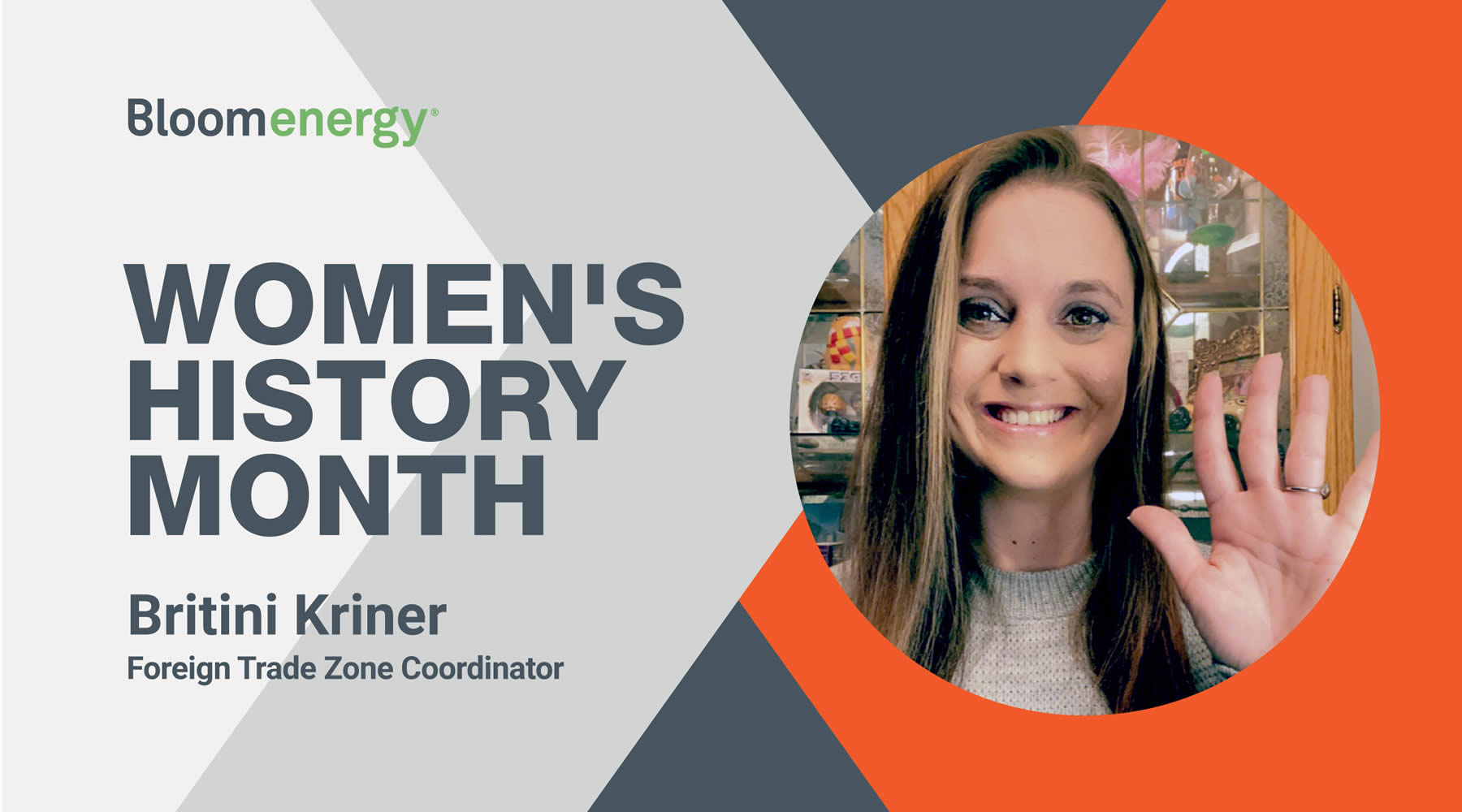Here at Bloom, our very own women shine in leadership roles across our business.
That’s why in honor Women’s History Month we’ll be spotlighting many of the talented women working at Bloom Energy.
In this four-part series, women of Bloom will share their unique stories and perspectives alongside the International Women’s Day theme of #ChooseToChallenge, showing solidarity and commitment to challenging inequality, calling out bias, developing a platform for discussion, and helping to forge an inclusive world. Each year an annual IWD campaign theme is celebrated and continues all year long to unify direction and galvanize activity by providing a meaningful framework to connect and amplify action. Enjoy the fourth installment in our series below.
Britini Kriner – Foreign Trade Zone Coordinator
Britini Kriner is a single mother to two beautiful children, a daughter age 12 and son age four. Britini has been with Bloom Energy for six years, currently holding the position of Foreign Trade Zone Coordinator for Delaware and California manufacturing facilities. She is responsible for ensuring that all international and domestic shipments are entered into their respective zones efficiently, and that they all pass the Customs compliance review for both states.
Britini is a recent honors graduate from Chesapeake College. She is plans to pursue a degree in industrial and organizational psychology in the fall.
In her spare time, Britini is learning how to capture life’s most precious moments in photography and is broadening her communication skills by learnings sign language. She is also the biggest Harry Potter fan you will ever meet. #TeamGryffindor
Don’t forget to check out past features in the series:
- Priya Gupta, director, finance
- Marisa Blackshire, senior director, environmental compliance and EH&S,
- Jessica Mahler, director, mechanical engineering
And, follow along with the Bloom Energy social channels as we continue to share featured women in honor of Women’s History Month.
This year’s theme for International Women’s Day is #ChooseToChallenge. How do you choose to challenge and call out gender bias and inequality, celebrate women’s achievements and/or help create an inclusive world?
I choose to challenge and call out gender bias and inequality by crushing the label of a typical single mom. I challenge this by continuously striving to achieve new goals and remove the boundaries commonly put on single mothers. In the past year, while I was fortunate enough to work remotely during the pandemic, I experienced a lot of challenges (that many others faced worldwide) balancing multiple roles as a single mother, teacher, and student.
In 2020, I attended college and maintained a spot on the Dean’s List, ultimately earning a degree in liberal arts. I learned how to be a teacher to my seventh grade, 12-year old daughter, all the while managing to keep my four-year old son occupied. I accomplished all of this while maintaining a full-time job. Rather than allowing my situation to limit my success, I was able to crush the gender bias by exceeding my Foreign Trade Zone (FTZ) administration responsibilities in Delaware and accepting new responsibilities over California as well. Instead of allowing bias to define me, I used it to empower me to reach my goals and push me further personally and professionally.
Who is the most influential woman you know? How does she inspire you?
I thought about this question for quite some time and honestly, I couldn’t just think of one. There are so many influential women in my life that I’ve never really focused on just one person. I think every woman has their own way to be an influence and I try to learn from every woman I meet – whether it is a new parenting hack, a confident power stance, or even a book they read that helped them become successful.
One woman, for example, would be my mom. My mom had me at a really young age and struggled as a teen mom raising me. That pushed me, as her daughter, to go to college because I wanted to make her proud and show her the struggle was worth it.
There are women at Bloom, and even some men, who have done nothing but help me grow. Teaching me how to communicate to a point I no longer get as nervous to speak in front of crowds. I still get the butterflies, but my nerves have calmed down tremendously with practice. . I have had both women and men as mentors that have helped me grow in different aspects of my career.
I also have friends who challenge me to do better. When they know I am at my breaking point, they push me to move forward.
One person that I need to include, that isn’t a woman, is my son Robby. I want Robby to grow up knowing that gender does not affect how you view a person and their attributes. I want him to be respectful of women, advocate for his sister and his mom, and be professional in his generation to come. Lastly, the biggest reason that I have to continuously push forward is for my daughter Lexy. I am continuously inspired by the phrase, “I can’t give up, my daughter is watching.” Lexy drove me to go to college, because I wanted her to see my determination and success. Because of my daughter, I pushed myself to apply to a male-dominated career as an Assembly Technician, and here I am six years later as a Foreign Trade Zone Coordinator.
I worked hard and I devoted my time, but it was from all the support I got from every person that walked into my life. It wasn’t just women, but I will say that the women I do have in my life are the most inspiring women I know and I am so grateful to have met each and every one of them. Pinning one woman or person to where I am today would be an understatement of not only my success and professional growth, but as a single mother learning to push forward.
What types of stereotypes do people have about women? Why can stereotyping be dangerous in the workplace?
I have had my own personal experience with stereotypes of being a woman back when I worked at RadioShack. I was managing my own store at 22-years old. People would ask for a different associate if I was working because they judged me, assuming I didn’t know the answers. RadioShack used to be a hobby shop where you could go to get connectors of all kinds, wiring, and capacitors. Patrons would make jokes like, “Where can I find the Flux Capacitors as I need a new one?” I would respond, “I am sure if you ask Marty Mcfly you will be headed in the right direction. Now, have you used a multi-meter to test your capacitor to ensure it is reading below 9 volts?” Then the conversation would get awkward because you could tell they felt silly.
My favorite stereotype is thinking that being a single mom isn’t a job in itself. This specific stereotype has become a big part of my life now that I am working remotely, because most people don’t experience the challenge of being a teacher to a 12-year old and a distraction to a four-year old, all while maintaining normal day-to-day responsibilities at work. Nothing screams exhaustion like being a single mom working from home during a pandemic, while your daughter does TikTok dances in the background of your Zoom calls and your toddler is trying to trampoline off of the walls screaming for a snack.. As a single mom, the work day really never ends. I think stereotyping in the workplace can be dangerous to your mindset by creating unnecessary stress or tension being consistently undermined by assumptions of typical gender roles.
What are some of the biggest challenges that women face today? How will these change in the next 20 years?
I think one of the biggest challenges women face today would be gender roles. One example is the consistent thought that the “male-dominated” profession still exists. This is one of the reasons I nearly did not apply to Bloom Energy, because in my mind, I assumed they would prefer a male in the position and I wouldn’t be hired.
A while ago, I attended an event that helped women become successful communicators. Something that intrigued me and that I was guilty of personally was how women are more likely to not apply to a position because they feel inferior to the job qualifications. We need to learn to press on and own our accomplishments. If we continue to use the terminology “male-dominated,” it will continue to be male-dominated. I would like to see professions in the next 20 years be recognized, not by gender, but by responsibility or a skillset. The focus should be on how well the job is done and less on who the job is being completed by. I don’t want to see a gender stereotype affect a person’s desire to pursue a specific career path. With that being said, I will also choose to challenge women to discontinue using the phrase “male-dominated” and start applying to those positions no matter their stereotyped gender role. Instead, we will create a diverse new environment for future generations working in the manufacturing industry.
Any advice you can give those women entering male-dominated professions such as manufacturing?
My advice to women going into any new profession would be for them to go in with a positive mindset. A big step in gaining this confidence is realizing gender is not the reason they were chosen for the job. If all else fails, step into a private area and deliver a power stance that forces you to be proud of the woman you are, own your accomplishments, and take another step forward into what could be the most successful part of your life. You never know if you don’t try, right?
Any closing thoughts?
People that know me personally in Delaware know that I am a die-hard Harry Potter fan. Emma Watson, who plays Hermione Granger and is my favorite actress, had an incredible quote that I use as inspiration in my own success and I will leave it here with you all.
“I don’t want other people to decide or assume who I am. I want to decide that for myself.”
I want to be a part of the women’s movement for our children’s future and generations to come. So, I will decide, along with every other woman, how we will become successful. It will not be defined by gender, but by our achievements and success.



